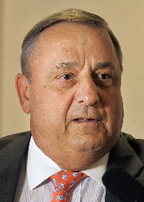It’s not uncommon for Gov. Paul LePage to make a comment and leave people wondering what he meant.
It happened again when a liberal blogger, Mike Tipping, posted a second snippet Wednesday from a secret recording of LePage speaking with members of a conservative women’s group in Falmouth.
In the first clip, the governor tells the audience at the Dockside Grill that the civil emergency he called last week would nullify the collective bargaining agreement with state employees – a claim that proved inaccurate.
In the latest clip, lasting 23 seconds, LePage says he has managed to squirrel away a $47 million surplus without state lawmakers’ knowledge.
“The economy as a whole is actually doing pretty well,” LePage says in the clip, recorded Monday. “I don’t want to tell any Democrats because they’ll have it spent before Christmas, but we have about $47 million since July 1 over budget.”
Peter Steele, a spokesman for the governor, said in an email Wednesday that the remark was a joke. Steele said LePage was referring specifically to a $47 million revenue surplus from the fiscal year that ended June 30 – not the current fiscal year.
“Obviously, the governor cannot hide any revenue from anyone,” Steele wrote. “The quip was made in jest, referring to how Democrats will always find a way to spend excess revenue, rather than using it to benefit the taxpayers.”
Before Steele’s explanation, LePage’s remark led Democrats to demand that the governor disclose the source of the surplus.
After all, they said, lawmakers expect that they will have to draft a supplemental budget to plug a still-undetermined hole in the state’s current $6.3 billion budget.
In September, the Legislature’s nonpartisan Office of Fiscal and Program Review posted a $6.7 million downward forecast for revenue through August. Grant Pennoyer, director of the office, said Wednesday that subsequent unreleased figures showed revenue running $13 million over projections.
Those numbers made LePage’s remark even more mysterious, since the governor apparently was referring to a surplus in the current fiscal year, which ends June 30, 2014.
Keeping such a sizable revenue surplus secret wouldn’t be easy. Marc Cyr, an analyst with the fiscal office, said it’s possible that the LePage administration could spend $47 million less than was budgeted last year.
In other words, state agencies – one or several – requested a certain amount of money for the current two-year budget but will end up spending far less.
Still, Pennoyer said it would be difficult to accumulate a $47 million expenditure surplus. He noted that the administration has already proposed $35 million in reductions, both in education funding cuts and the management of staffing vacancies.
The reductions are the easiest way to trim agency budget lines.
Steele, in his statement, noted that a revenue surplus is largely spoken for because of state law. Under state law, any excess money goes toward replenishing the governor’s contingency fund, the retirement allowance fund and the fund backstopping the Finance Authority of Maine. It then cascades into specific accounts, including the health insurance fund for retired state employees, the rainy day fund and the tax relief fund.
Still, the governor’s leaked statement touched off a brief swirl of speculation on social media as progressives wondered if he had been caught lying or deliberately hiding information from the Democrat-controlled Legislature.
The recording of LePage was one of several obtained by Tipping, a blogger and liberal activist with the Maine People’s Alliance. Last year, Tipping published a recording from a private gathering of Republican lawmakers in which the governor hinted at a secret plan that would rile Democrats and require a special legislative session. It was later determined that LePage was foreshadowing his plan to pay off the state’s Medicaid reimbursement debt to Maine hospitals.
LePage has also made several comments that proved to be inaccurate or required his staff to clarify his meaning.
In 2012, the governor told an audience in Lewiston that he would be forced to close public schools if lawmakers didn’t approve his plan to cut funding for the Department of Health and Human Services. The Legislature controls public education funding and state law mandates that students have a certain number of school days.
Steve Mistler can be contacted at 791-6345 or at:
smistler@pressherald.com
Twitter: @stevemistler
Send questions/comments to the editors.


